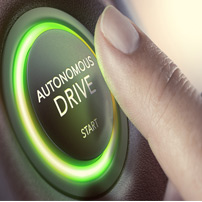Tesla Shares Blame in First-Known Semi-Autonomous Car Fatality
October 16, 2017 After an in-depth investigation into the fatal 2016 crash of a semi-autonomous Tesla sedan, the National Transportation Safety Board (NTSB) determined that the vehicle’s autopilot system contributed to the wreck. The NTSB found that the Tesla Model S allowed to driver to use the Autopilot system outside of the specified environment for which it was designed. As a result, the driver was fatally injured when the vehicle’s autonomous feature failed to stop as a big-rig truck was making a left turn in front of him.
After an in-depth investigation into the fatal 2016 crash of a semi-autonomous Tesla sedan, the National Transportation Safety Board (NTSB) determined that the vehicle’s autopilot system contributed to the wreck. The NTSB found that the Tesla Model S allowed to driver to use the Autopilot system outside of the specified environment for which it was designed. As a result, the driver was fatally injured when the vehicle’s autonomous feature failed to stop as a big-rig truck was making a left turn in front of him.
While 100 percent of the blame was not assigned to Tesla, as the truck driver involved failed to yield while entering the roadway, the incident does shine a light on the potential safety issues of autonomous vehicles. In this case, the vehicle’s software allowed the driver to remain disengaged from the driving task for too long.
In addition, the autopilot system should not have engaged, given the type of road on which it was travelling. Tesla uses technology that senses whether a driver’s hands are on the steering wheel as a way to determine if he or she is paying attention. According to the NTSB, this is not an effective way to detect if a driver is paying attention to the road.
Robert L. Sumwalt, Chairman of the NTSB, commented that Tesla’s system performed correctly, but it was only designed to perform in certain environments. In this case, he said, the driver was allowed to divert his attention for too long. If the Autopilot feature was able to identify the truck, it could have stopped the vehicle and avoided this tragic fatality.
Tesla Remains Committed to Self-Driving Technology
According to a written statement from Tesla in light of the NTSB’s analysis of the accident, the company will continue to perfect their technology with an ongoing commitment to customer safety. The statement also took the opportunity to remind all customers that the Autopilot function is not a fully self-driving technology. Drivers must remain engaged and attentive at all times.
As the industry accelerates its development of self-driving vehicles, the NTSB urges semi-autonomous vehicle manufacturers to develop technology that prevents the use of Autopilot in an environment where the technology should not be used. For example, the fatality involving the Tesla vehicle took place on a state road that has access from cross streets. According to NTSB Human Performance Investigator, Ensar Becic, it can be difficult for a driver to interpret which roads are appropriate to use Autopilot. One potential solution is to use satellite data to help determine whether the type of road is appropriate to use Autopilot.
The National Highway Traffic Safety Administration urges car manufacturers to investigate technology that is more effective at determining whether a driver is paying attention to the road. One example is the use of a camera that tracks the driver’s eye and head movement to ensure that he or she is focused on driving.
Baltimore Car Accident Lawyers at LeViness, Tolzman & Hamilton Seek Compensation for Victims of Car Accidents
If you have been injured in a car accident involving a self-driving vehicle, contact the Baltimore car accident lawyers at LeViness, Tolzman & Hamilton as soon as possible. As this new technology continues to develop, we remain committed to protecting your rights and obtaining the maximum financial compensation you deserve. To schedule a free consultation, call us today at 800-547-4LAW (4529) or contact us online.
Our offices are located in Baltimore, Columbia, Glen Burnie, and Towson, allowing us to represent car accident victims in Maryland, including those in Anne Arundel County, Carroll County, Harford County, Howard County, Montgomery County, Maryland’s Western Counties, Southern Maryland, and the Eastern Shore, as well as the communities of Catonsville, Essex, Halethorpe, Middle River, Rosedale, Gwynn Oak, Brooklandville, Dundalk, Pikesville, Nottingham, Windsor Mill, Lutherville, Timonium, Sparrows Point, Ridgewood, and Elkridge.






